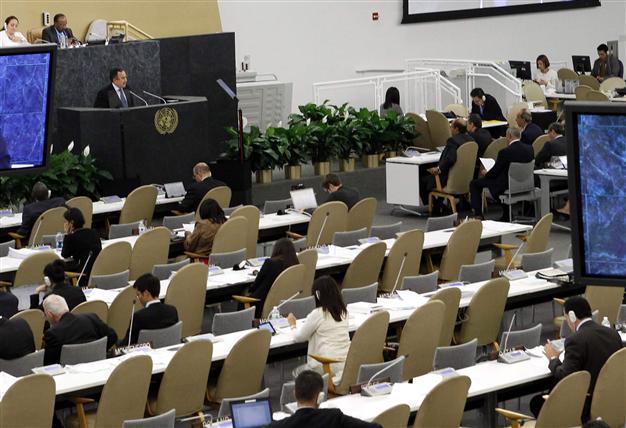New members of UN rights council draw criticims
UNITED NATIONS

Egypt’s Minister of Foreign Affairs Nabil Fahmy addresses the 68th. REUTERS photo
China, Russia, Saudi Arabia, Vietnam, Cuba and Algeria won seats on the U.N. Human Rights Council on Nov. 12, riling independent human rights groups who said their election undermined the rights watchdog’s credibility.
The General Assembly elected 14 new members to the 47-seat Geneva-based council, which can shine a spotlight on rights abuses by adopting resolutions – when it chooses to do so. It also has dozens of special monitors watching problem countries and major issues ranging from executions to drone strikes.
Britain, France, the Maldives, Macedonia, Mexico, Morocco, Namibia and South Africa were also elected to three-year terms. Human Rights Watch noted that five of the new council members – China, Russia, Saudi Arabia, Vietnam and Algeria – have refused to let U.N. investigators visit their own countries to check alleged abuses.
China, Russia and Algeria have 10 or more unfulfilled requests for visits by U.N. experts, some dating back to 2000, the group said. Saudi Arabia and Vietnam each have seven outstanding requests, they said.
In response to criticism of its human rights record, Cuba said in May that it would consider letting in U.N. investigators to examine allegations of torture and repression and allowing Red Cross officials access to its prisons for the first time in nearly 25 years.
“Countries that haven’t allowed U.N. experts appointed by the council to visit have a lot of explaining to do,” said Peggy Hicks, global advocacy director of the New York-based nongovernment group. “It’s like hiring someone, then not allowing them to enter the office.”
After the election, U.S. Ambassador to U.N. Samantha Power released a statement saying: “Fourteen countries were elected to the Human Rights Council today, including some that commit significant violations of the rights the council is designed to advance and protect.”
The election is a reminder that the council’s important work remains unfinished, she said, without naming any offenders.
'Worst new members'Across the street from the main gate of U.N. headquarters, pro-Tibet activists hung a huge banner saying “China Fails Human Rights.” Seats, allotted by region, are sometimes contested and sometimes not. All 193 members of the General Assembly can vote by secret ballots, which were collected in wooden ballot boxes from delegates.
Geneva-based U.N. Watch, a frequent critic of U.N. rights practices, denounced what it considered the worst new members. “China, Cuba, Russia, and Saudi Arabia systematically violate the human rights of their own citizens, and they consistently vote the wrong way on U.N. initiatives to protect the human rights of others,” said U.N. Watch executive director Hillel Neuer. “For the U.N. to elect Saudi Arabia as a world judge on human rights would be like a town making a pyromaniac into chief of the fire department.”
Neuer lamented that neither the U.S. nor the EU had said a word about “hypocritical candidacies that will undermine the credibility and effectiveness of the U.N. human rights system,” saying, “By turning a blind eye as human rights violators easily join and subvert the council, leading democracies will be complicit in the world body’s moral decline.”
U.N. Watch and other groups have also criticized the Human Rights Council for its preoccupation with reports and resolutions criticizing Israel over the Palestinian issue. By contrast, Neuer said the council has never adopted a resolution critical of Russia, China or Saudi Arabia.
The losers in the balloting were Uruguay, beaten by Cuba and Mexico for seats in the Latin America and Caribbean group; and South Sudan, which failed to get enough votes to win one of the four African seats.
